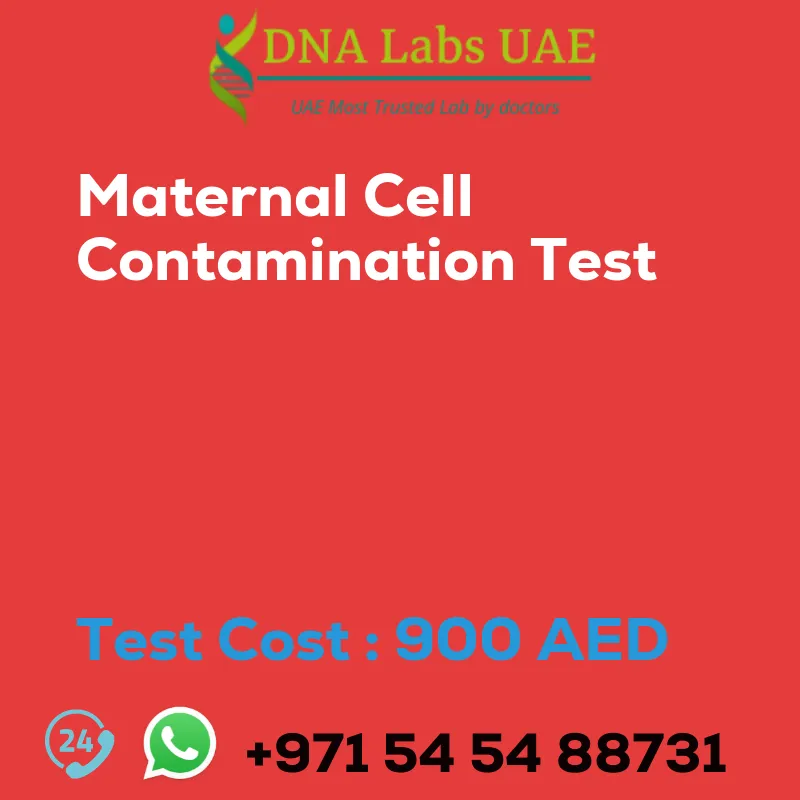Maternal Cell Contamination Test Cost AED: 900.0
Welcome to DNA Labs UAE, your trusted genetic lab for all your testing needs.
Test Details:
Test Name: Maternal Cell Contamination Test
Components: EDTA Vacutainer (2ml) of mother + Amniotic fluid / Chorionic villi in Sterile Container
Price: 900.0 AED
Sample Condition: Amniotic fluid / Cord Blood / Chorionic villi
Report Delivery: 2-3 days
Method: PCR
Test Type: Genetics
Doctor: General Physician
Test Department:
Pre Test Information: Maternal Cell contamination can be done with a Doctors prescription. Prescription is not applicable for surgery and pregnancy cases or people planning to travel abroad.
Understanding Maternal Cell Contamination:
Maternal cell contamination (MCC) refers to the presence of maternal cells in a sample that is supposed to contain only fetal cells. This can occur in various prenatal testing methods, such as chorionic villus sampling (CVS) or amniocentesis, where a sample is taken from the placenta or amniotic fluid to analyze the genetic makeup of the fetus.
MCC can be problematic because it can lead to incorrect test results. For example, if maternal cells are present in a sample, the genetic testing may detect the mother’s DNA instead of the fetus’s DNA, leading to a false negative or inconclusive result. This can cause unnecessary anxiety and may require further testing.
To minimize the risk of MCC, laboratories use various techniques to separate fetal cells from maternal cells. These techniques may include fluorescence in situ hybridization (FISH), polymerase chain reaction (PCR), or microarray analysis. These methods help identify and exclude maternal cells from the analysis, ensuring more accurate results.
It is important for healthcare providers and laboratories to be aware of the potential for MCC and take appropriate precautions to minimize its occurrence. By using advanced techniques and protocols, the risk of MCC can be significantly reduced, improving the accuracy of prenatal genetic testing.
| Test Name | Maternal Cell contamination Test |
|---|---|
| Components | EDTA Vacutainer (2ml) of mother + Amniotic fluid / Chorionic villi in Sterile Container |
| Price | 900.0 AED |
| Sample Condition | Amniotic fluid \/ Cord Blood\/Chorionic villi |
| Report Delivery | 2-3 days |
| Method | PCR |
| Test type | Genetics |
| Doctor | General Physician |
| Test Department: | |
| Pre Test Information | Maternal Cell contamination can be done with a Doctors prescription. Prescription is not applicable for surgery and pregnancy cases or people planing to travel abroad. |
| Test Details | Maternal cell contamination (MCC) refers to the presence of maternal cells in a sample that is supposed to contain only fetal cells. This can occur in various prenatal testing methods, such as chorionic villus sampling (CVS) or amniocentesis, where a sample is taken from the placenta or amniotic fluid to analyze the genetic makeup of the fetus. MCC can be problematic because it can lead to incorrect test results. For example, if maternal cells are present in a sample, the genetic testing may detect the mother’s DNA instead of the fetus’s DNA, leading to a false negative or inconclusive result. This can cause unnecessary anxiety and may require further testing. To minimize the risk of MCC, laboratories use various techniques to separate fetal cells from maternal cells. These techniques may include fluorescence in situ hybridization (FISH), polymerase chain reaction (PCR), or microarray analysis. These methods help identify and exclude maternal cells from the analysis, ensuring more accurate results. It is important for healthcare providers and laboratories to be aware of the potential for MCC and take appropriate precautions to minimize its occurrence. By using advanced techniques and protocols, the risk of MCC can be significantly reduced, improving the accuracy of prenatal genetic testing. |







